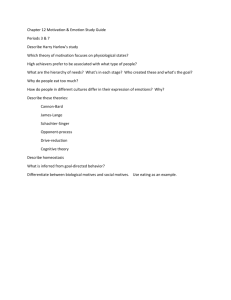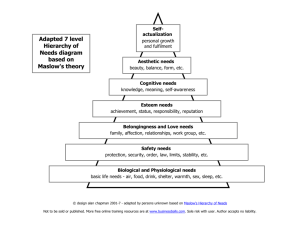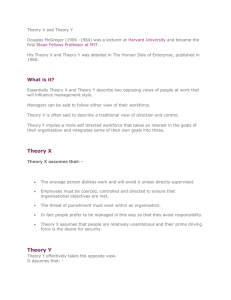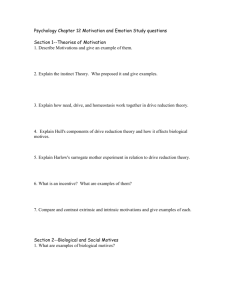Theory X and Y of Motivation
advertisement
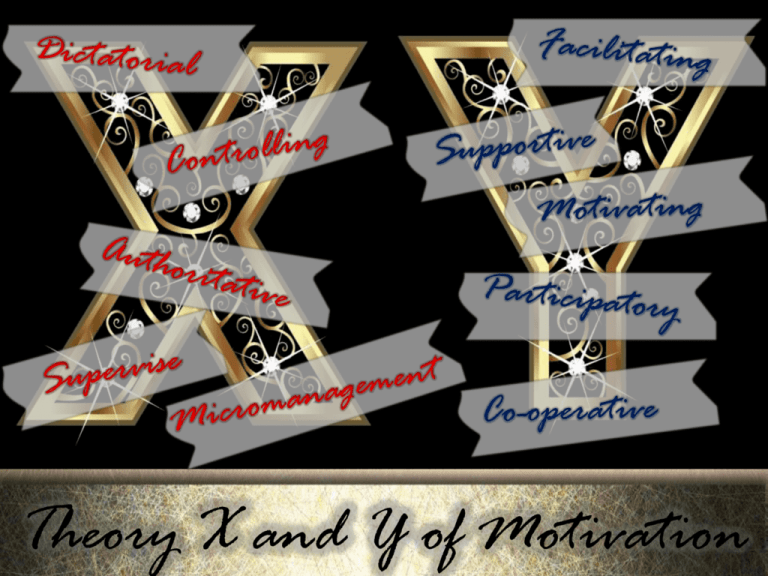
Theory X and Y of Motivation Objective • Explain What is Motivation • Explain Theory X and Y of Motivation • List the Assumptions of Theory X • List the Assumptions of Theory Y • Explain Importance of Theory X and Y of Motivation • Explain the Motivation of Different Personalities • Explain the Role of Self Motivation in Theory Y • Explain the Role of Self-Confidence in Theory Y • Explain the Implications of Theory X and Theory Y • Describe Traits of Theory X Organizations • Describe Traits of Theory Y Organizations • List the Characteristics of Theory X Manager • List the Characteristics of Theory Y Managers • Compare Theory X and Theory Y of Motivation • List the Tips for Motivating Employees Introduction Let us look at two managers, Carlos Sanchez and Janet Wilson working at Helion Inc. Carlos Sanchez Janet Wilson Introduction Carlos is well-known in his organization as a highly authoritarian manager. He tends to supervise his team at every step of their job tasks. He always micromanages his team and does not give them the freedom to make their own decisions or work independently on their own. Introduction On the other hand, let us look at how Janet manages her team. Janet is popular in her organization as a very co-operative and helpful manager. She is well-known for her participatory style of management. She allows her team to work independently their assigned job tasks without supervising them at each and every step. She also allows her team members to make decisions on their own and does not micromanage them at each step. on Introduction Carlos Sanchez Janet Wilson Carlos is a ‘Theory X’ manager whereas Janet is a ‘Theory Y’ manager. Introduction Let us learn about ‘Theory X and Y of Motivation’ in detail. Theories of Motivation Early Theories of Motivation • Maslow's' Hierarchy of Needs Theory • Theory X and Theory Y • Two-factor Theory • Herzberg's Theory of Factors • McClelland’s Theory of Needs Contemporary Theories of Motivation • • • • • Self-Determination Theory Goal-Setting Theory Self-Efficacy Theory Reinforcement Theory Equity Theory/Organizational Justice • Expectancy Theory What is Theory X and Y of Motivation? In 1960, based on Maslow's Hierarchy of Needs, Douglas McGregor proposed a ‘Theory X and Y of Motivation’. McGregor grouped the Maslow's Hierarchy into lower-order needs known as ‘Theory X’ and higher-order needs known as ‘Theory Y’. Therefore, managers and management could use either set of needs to motivate employees. Douglas McGregor formulated ‘Theory X’ and ‘Theory Y’ suggesting two aspects of human behavior at work, or in other words, two different views of individuals or employees. Classification of Motives Motives can be classified as: Primary Motives Secondary Motives Let’s take a look at each in detail. General Motives Assumptions of Theory X The following are the assumptions of Theory X: An average employee intrinsically does not like work and tries to escape work whenever possible. This Theory assumes that a close supervision of each employee is required by the managers. In this theory, the management and managers adopt a more dictatorial style. Many employees rank job security on top, and they have little or no aspiration/ ambition. Assumptions of Theory Y The following are the assumptions of Theory Y: Employees can perceive their job as relaxing and normal. Employees exercise their physical and mental efforts in an inherent manner in their jobs. Employees do not require threat, external control and coercion to work. ManagementStudyGuide.com This is a DEMO Course On – Theory X and Y of Motivation. Join MSG Premium Membership and Get Access to around 120 Courses + New courses added every week. What You Get: 1. View All Courses Online. 2. Download Powerpoint Presentation for Each Course. 3. Do the Knowledge Checks for Each Course.
